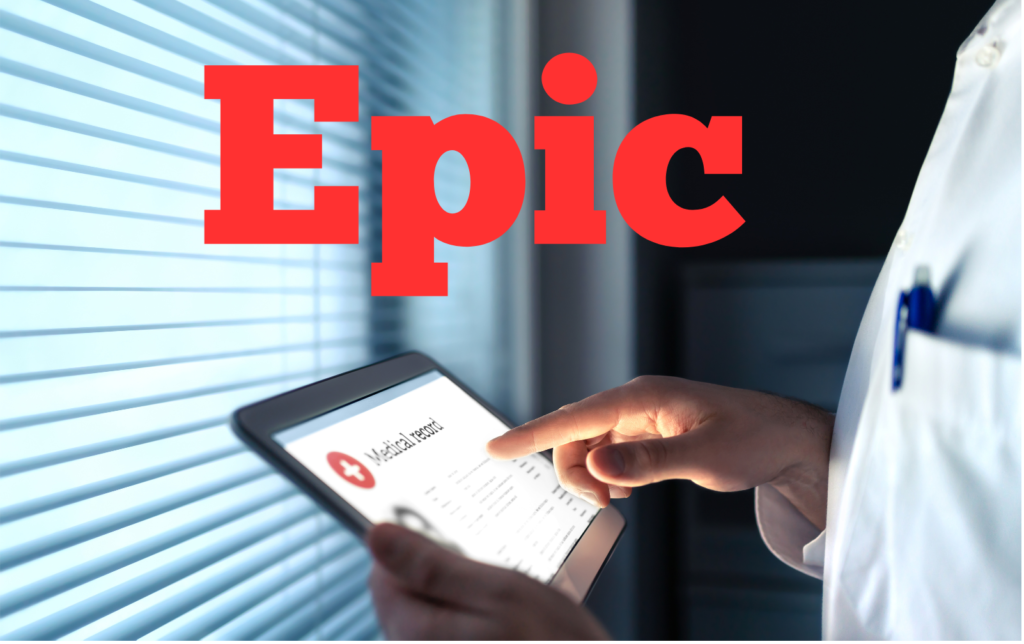The adoption of Epic’s electronic health record (EHR) system by leading health systems continues to reshape the healthcare landscape. With its growing dominance in the acute care EHR market, Epic has become the platform of choice for many organizations striving for efficiency, integration, and improved patient care. Recent developments at Northwell Health, Sarasota Memorial Health Care System, and the University of Pittsburgh Medical Center (UPMC) illustrate both the opportunities and challenges of implementing Epic at scale.
Epic’s Dominance in the EHR Market
In 2023, Epic captured 52% of the acute care market share, outpacing all competitors. This growth is fueled by consistent performance, robust integration capabilities, and a reputation for reliability. Health systems increasingly view Epic as a long-term investment that streamlines operations, enhances clinician satisfaction, and improves patient outcomes.
Although other vendors like Meditech and Oracle Health maintain footholds in certain segments—HCA Healthcare and the Veterans Affairs Department being notable examples—Epic’s wins are notable. Recent adopters such as ChristianaCare, the University of Alabama Health System, and UPMC have reinforced Epic’s position as the gold standard for EHR systems.
Northwell Health: A $1.2 Billion Digital Transformation
Northwell Health, New York’s largest healthcare provider, is embarking on a transformative journey to implement Epic’s EHR across its 21-hospital system. The project, part of a broader digital transformation, also includes integrating Salesforce as its customer relationship management (CRM) system.
Key Details:
- Cost: $1.2 billion for the Epic-Salesforce integration, including implementation, training, and ongoing support.
- Process: After less than a year of due diligence, Northwell selected Epic for its seamless integration capabilities and strong reputation.
- Timeline: The first phase of the rollout began in early 2023, with subsequent phases planned through 2025.
Northwell’s decision was driven by both strategic and operational factors. Physicians had long advocated for a switch to Epic, citing its user-friendly interface and ability to enhance care delivery. This sentiment culminated in a standing ovation during the announcement—a testament to the widespread support for the initiative.
Despite some delays, Northwell remains committed to ensuring the system is fully adopted. As Executive Vice President Joseph Moscala noted, “Not only do you have to capture everyone’s minds, but you’ve got to capture their hearts.”
UPMC: A Streamlined Future
The University of Pittsburgh Medical Center (UPMC) is another major player transitioning to Epic. With 40 hospitals and a history of acquisitions, UPMC faced the challenge of managing nine disparate EHR systems. This fragmented IT infrastructure prompted a reevaluation during the COVID-19 pandemic, leading to the decision to consolidate onto a single Epic platform.
Key Benefits of Epic Implementation at UPMC:
- Application Reduction: From 1,000 to around 200 applications, significantly lowering IT complexity.
- Cost Efficiency: Although costs were not disclosed, UPMC predicts a return on investment by the end of the decade.
- Improved Operations: A unified platform facilitates better data sharing and streamlined workflows.
UPMC’s Chief Information Officer Ed McCallister likened the pre-Epic environment to a “swan”—calm above the surface but chaotic below, as IT teams worked tirelessly to integrate disparate systems. With Epic, UPMC anticipates a more cohesive and manageable approach to EHR operations.
Sarasota Memorial: Strategic Planning for Smaller Systems
Smaller health systems face unique challenges in adopting robust EHR platforms like Epic. Sarasota Memorial Health Care System, a publicly owned hospital in Florida, undertook a three-year review to assess its options before committing to Epic. The decision was based on long-term cost-effectiveness and patient care improvements, even though the upfront investment is significant.
Key Insights:
- Cost: Estimated at $225 million, covering implementation and training.
- Timeline: Full rollout expected within two years.
- Patient-Centric Vision: Epic’s widespread adoption by larger systems ensures better continuity of care for Sarasota’s seasonal residents.
CEO David Verinder emphasized that long-term projections—10 to 20 years—justified the higher costs. The move to Epic is expected to enhance care coordination, especially for patients who receive care in multiple states.
Why Health Systems Choose Epic
1. Proven Reliability
Epic’s track record of consistent performance has made it a trusted choice. Health systems value its stability and the assurance that implementation challenges will not outweigh the benefits.
2. Integration Capabilities
Epic excels in integrating with other platforms, such as CRMs like Salesforce, enabling organizations to create a more connected and patient-centered ecosystem.
3. Support for Consolidation
As mergers and acquisitions increase, Epic provides a scalable solution for unifying disparate EHR systems. This is critical for health systems like UPMC, which need to streamline operations across multiple facilities.
4. Clinician and Patient Satisfaction
Epic’s user-friendly design fosters clinician adoption, reducing burnout and improving the overall care experience. Patients also benefit from better data sharing, enhanced communication, and more efficient care delivery.
Challenges and Considerations
High Costs
Epic’s upfront costs are substantial, requiring health systems to commit significant financial resources. However, most organizations predict a positive return on investment within a decade.
Implementation Hurdles
Rolling out Epic across multiple sites is a complex, multi-year process. Timelines can shift, and unexpected issues may arise, requiring strong project management and stakeholder engagement.
Vendor Competition
While Epic dominates the market, competitors like Meditech and Oracle Health offer alternatives that may appeal to smaller systems or those with budget constraints.
Looking Ahead: The Future of EHRs
The adoption of Epic by Northwell, UPMC, and Sarasota Memorial underscores the growing emphasis on integrated, value-driven healthcare delivery. These case studies demonstrate how large and small systems alike are leveraging technology to improve patient outcomes, streamline operations, and adapt to an increasingly interconnected healthcare landscape.
As more organizations transition to unified platforms, the focus will shift toward optimizing these systems to drive innovation, enhance interoperability, and deliver measurable value. For healthcare leaders, the journey to digital transformation is as much about strategy and culture as it is about technology.


